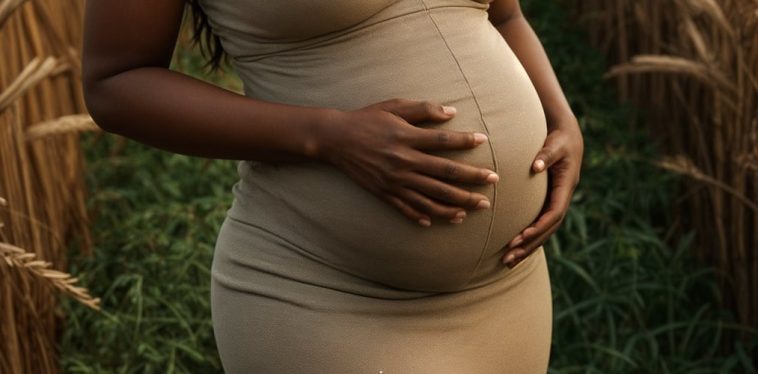One uncharacteristically cold afternoon, Kabagambe sat marinating in his small, stuffy room. It smelled distinctly of a young man’s living quarters—a potent cocktail of sweat, despair, and the lingering ghosts of past meals. His eyes scanned the small stool where a half-eaten rolex was lying lifelessly, a sole tomato falling out of the colourless polythene. He thought he had a pretty good idea what that tomato must feel, cold, all the life knocked out of it. He still could not believe he was in this position. He exhaled a deep, theatrical sigh—the sigh of a man who had just watched his life take a sharp, screeching left turn into catastrophe.
The reason for his predicament was simple yet staggeringly unfortunate: Shakira was pregnant. It had all begun on an evening he entirely blamed on excessive boredom. Shakira—the girl from across the floor with the nose like a well-used bicycle-seat, a suspiciously hairy upper lip, and who had until recently possessed the erotic allure of a comatose chicken—had been in his room. They’d killed the last of his Jameson, watched an uneventful film, and then, hopelessly drunk, shared a boda down the hill to Aunt Dora’s where the beers were 3000 shillings. It was coming on 10 o’clock when they finally left, and on the rattling back seat of the Pioneer number 61 bus as it climbed the hill, he had, with a staggering lack of foresight, taken her virginity.
“Shit. Shit, shit, shit!” had been his immediate response. He later reflected that he could have mustered something more inventive, but then again, originality had never been his strong suit. The words had presented themselves like an overeager intern who doesn’t know when to stop talking.
Later, in a misguided attempt at gallantry, he had taken her to Chicken Tonight. He had stuffed her with cheap food and told her she’d given him the best night of his life. She had stared at him with bovine adoration and pressed into his palm one of those friendship bracelets with a name woven into it—his name, in bold capital letters as if he might one day forget it. He had pocketed it with a self-satisfied grin, convinced he had handled the situation with the grace of a seasoned diplomat.
There was something intoxicating about the recklessness of youth. It wasn’t just the alcohol—it was freedom, that electric sense that nothing truly mattered, that tomorrow was a problem for a future, wiser version of yourself. If history had taught him anything, it was that young people had been making spectacularly terrible decisions for centuries, and somehow, the world kept spinning.
Take Romeo and Juliet. A pair of teenagers, high on hormones and melodrama, willing to drink poison over a love that hadn’t even lasted a week. Or Okonkwo in Things Fall Apart, whose unchecked pride and impulsiveness led him to ruin. Even Jesus’ disciples had a Judas—proof that catastrophic miscalculations transcended time and culture.
But did that make recklessness inherently bad? Could it not also be the fire that fueled greatness? What was the line between foolishness and bravery? If people always thought things through, nobody would have ever sailed across oceans, climbed mountains, or, in his specific case, believed three shots of Jameson were an acceptable substitute for common sense.
Perhaps recklessness was not the problem—perhaps the real tragedy lay in the utter inability to manage its consequences.
Kabagambe sighed and rubbed his face, his fingers grazing the stubble that had become his constant companion. He had read somewhere that the prefrontal cortex—the part of the brain responsible for rational decision-making—wasn’t fully developed until twenty-five. He still had two years to go. Was it fair to hold him accountable for a decision made with an unfinished brain?
And yet, society did. Society always did. The same world that romanticized wild, free youth was the same one that came down hardest when the bill for that freedom arrived, stamped “Due Immediately.”
And then came the knock.
Now, one generally expects nothing good from a knock at the door, particularly when one is in the middle of contemplating their life’s ruin. True to form, Kabagambe opened it to find Shakira standing there with an unreadable expression. Beside her stood a formidable woman who looked as though she could fell a mahogany tree with a single stare. Her arms were folded like a portcullis, her jaw was set, and her aura radiated the kind of authority that makes men suddenly remember urgent errands in the opposite direction.
“Kabagambe,” she said, with all the warmth of a tax auditor, “we need to talk.”
A man in his position had three options. One: feign deafness and attempt a desperate climb out the window. Two: drop to his knees and start composing an elaborate lie involving amnesia and a blow to the head. Three: face the music like a man (or at least a man who had run out of plausible escape routes).
He sighed again and stepped aside, the door feeling heavier than it ever had. Kabagambe knew what was coming. Virginity was currency, and Shakira had just spent hers on a man with nothing to offer.
The elders would arrive soon, each one eager to impart wisdom they themselves had conveniently ignored in their youth. His father would deliver a lengthy sermon on “responsibility,” skillfully glossing over his own more colourful adventures. His mother would wail like a professional mourner, lamenting the disgrace he had brought upon the family name—never mind that Uncle Moses had fathered half of Masaka and still got preferential seating in Church.
But perhaps the most tragic part of it all was the unfortunate fate of his future child. Kabagambe had already decided she was a girl, and given Shakira’s genetic contributions, the poor thing had a mountain to climb in the looks department. The baby would emerge, he was sure of it, squinting at the fluorescent hospital lights and thinking, “Oh no, what fresh hell is this?”
So here he was. A young man, once full of a promise he could never quite name, staring down the twin barrels of fatherhood and in-law negotiations. He was now faced with a situation that demanded action, courage, and—if nothing else—a well-rehearsed look of profound remorse.
He squared his shoulders, a gesture that felt both ridiculous and necessary, and turned to the two women who now occupied his filthy couch.
“Right,” he said, clearing a throat that had gone suddenly dry. “I suppose we should, er… talk.”
And thus, began what would surely be the longest, most expensive conversation of his life.
This post was created with our nice and easy submission form. Create your post!





